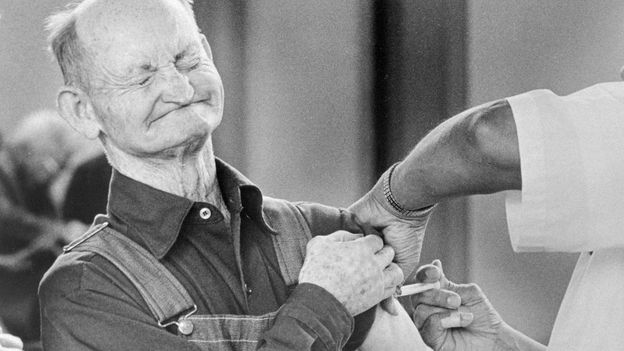The fiasco of the 1976 ‘swine flu affair’

Scientists, however, are human too. Today, it’s easy to see gaps in the scientific evidence of 1976, such as the belief that the virus mirrored the 1918 outbreak or that a pandemic was due. But the scientists of the time could not, so faced with uncertainty, they made conclusions influenced by belief, instinct or fear. The same must almost certainly be true today. The science of viruses in 2020 may be far more sophisticated, but the science of Sars-Cov-2, the virus that causes the disease Covid-19, remains incomplete. According to Fineberg, the swine flu affair was characterised by “overconfidence in theory spun from meagre evidence”. There was also a kind of “hero” effect at play, says Fineberg, where the fear of disaster led to an immovable zeal.
So, when politicians in the present day talk of “the science” as if it is a complete body of knowledge, a manual for what to do, it neglects the uncertainty of evidence and ignores that science is a human endeavour.
As for Imperato, remembering the day he was vaccinated for the cameras and the surrounding chaos gives him some concerns about what’s ahead in 2020. “I really see the beginnings of the same patterns of commentary about the Covid-19 vaccines and the trials,” he says. There’s no reason, he believes, why a mass vaccination effort could not be rolled out quickly, but he worries about the media context it will happen within. “There are so many talking heads, on television and on social media, commenting on every aspect of this pandemic,” he says. “Their credentials are not matched to what they’re commenting on. I refer to them as trespassers.”
The swine flu affair of 1976 holds many lessons for today, says Imperato, and there’s wisdom in the aphorism that those who ignore the lessons of history are doomed to repeat it. Still, throughout his career he has remained a strong advocate for the life-saving properties of vaccines. “You know, all that happened while I was getting my shot, it didn’t dissuade me. I still went ahead with it.”
*Richard Fisher is a senior journalist for BBC Future, and tweets @rifish
—
As an award-winning science site, BBC Future is committed to bringing you evidence-based analysis and myth-busting stories around the new coronavirus. You can read more of our Covid-19 coverage here.
Join one million Future fans by liking us on Facebook, or follow us on Twitter or Instagram.
If you liked this story, sign up for the weekly bbc.com features newsletter, called “The Essential List”. A handpicked selection of stories from BBC Future, Culture, Worklife, and Travel, delivered to your inbox every Friday.
*** This article has been archived for your research. The original version from BBC News can be found here ***


